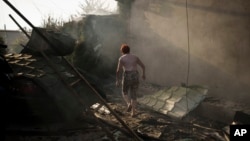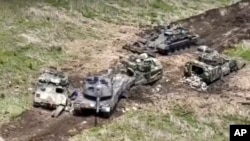Latest developments:
- Russian President Vladimir Putin said Moscow would deploy some of its tactical nuclear weapons to Belarus next month. Putin said during Friday's meeting with Belarusian President Alexander Lukashenko that the facilities for the nuclear weapons would be completed by July 7-8, and that the weapons would be moved to Belarus quickly after that.
- The International Court of Justice has accepted requests from 32 countries to back Ukraine in a genocide case against Russia, the United Nations' highest court said Friday. It's the largest number of countries to join another nation's complaint at the world court based in The Hague, Netherlands.
- Ancient Crimean gold artifacts that were on display abroad will be returned to Ukraine and not to Crimea, which Russia annexed in 2014, the Dutch Supreme Court ruled Friday.
Intense fighting was being reported on Ukraine’s front lines Friday, but independent media weren't able to assess whether this was the beginning of the much-anticipated Ukrainian counteroffensive or whether Ukraine was penetrating Russian defenses.
In his nightly video address, Ukraine President Volodymyr Zelenskyy said he had discussed tactics and achievements with military leadership, but he did not go into details.
"For our soldiers, for all those who at this time are engaged in particularly heavy combat: We see your heroism, and we are grateful for every moment of your lives. Ukraine is as free as you are strong," he said.
Moscow and pro-war Russian bloggers reported intense battles on the Zaporizhzhia front near the city of Orikhiv, around the midpoint of the land bridge linking Russia to the Crimean Peninsula.
Russian President Vladimir Putin expressed certainty that "this offensive has begun," and added that "Ukrainian troops did not achieve their goals in any sector."
"The initial counteroffensive operations may be the most difficult and slowest, as they involve penetrating prepared defensive positions," the Institute for the Study of War noted in its latest assessment. "Initial setbacks are to be expected. This phase may also see the highest Ukrainian losses."
Both sides have had ample time to prepare for this moment. Ukrainian forces are armed with Western artillery, tanks and training. But Russia's military has entrenched its positions and has brought in additional forces, Axios reported.
New US aid for Ukraine
Earlier Friday, the Pentagon announced a new $2.1 billion assistance package for Ukraine that it said includes critical air defense and ammunition capabilities.
The package includes HAWK air defense systems and missiles, 105 mm and 203 mm artillery rounds, Puma unmanned aerial systems, laser-guided rocket system munitions, and support for training and maintenance, the Defense Department said in a statement.
According to the department, since the beginning of the Russian offensive, the U.S. has committed more than $40.4 billion is security assistance to Ukraine.
Since Russia invaded Ukraine in February 2022, the Biden administration and Congress have provided more than $75 billion in humanitarian, financial and military support to Ukraine. This is the first time a European country has held the top spot in U.S. foreign aid since the Truman administration’s Marshall Plan after World War II, the Council on Foreign Relations said.
Kakhovka dam explosion
Clear signals of an explosion occurred at the Kakhovka dam in southern Ukraine early Tuesday morning, Norwegian seismic research foundation Norsar said Friday.
Earlier in the day, a U.S. official told The New York Times that American spy satellites equipped with infrared sensors detected an explosion at the Kakhovka dam just before it collapsed, unleashing a torrent of floodwater into surrounding areas this week.
The official said that satellites had detected a heat signature consistent with a major explosion, the official told the newspaper.
The AP flew a drone over the dam Wednesday and reported that there were no signs of an attack from above and “no scorch marks or shrapnel scars” visible on buildings above the flooding that would be “typical of a bombardment,” which Russia accuses Ukraine of having carried out.
Russians and Ukrainians have traded blame for the destruction of the vast Soviet-era dam, which is under Russian control.
Officials said more than 6,000 people had been evacuated from dozens of inundated cities, towns and villages on both sides of the Dnipro River. But the true scale of the disaster remains unclear for a region that was once home to tens of thousands of people. At least 14 people have died in the flooding, many are homeless and tens of thousands are without drinking water.
Iranian drones
The White House said Friday that Russia seemed to be deepening its defense partnership with Iran and that it had received hundreds of one-way attack drones it's been using to hit Ukraine.
Citing newly declassified information, the White House said the drones, or unmanned aerial vehicles (UAVs), were built in Iran, shipped across the Caspian Sea and then used by Russian forces against Ukraine.
“We have information that Russia is receiving materials from Iran needed to build a UAV manufacturing plant inside Russia,” said National Security Council spokesperson John Kirby in a statement sent to VOA Thursday. “This plant could be fully operational early next year.”
The White House released satellite imagery of the planned location of the UAV manufacturing plant in Russia’s Alabuga Special Economic Zone.
Crimean treasures
Ancient Crimean gold artifacts that were on display abroad will be returned to Ukraine and not to Crimea, which Russia annexed in 2014, the Dutch Supreme Court ruled Friday, ending a long, bitter tussle over the treasures.
More than a thousand ancient objects, including a solid gold Scythian helmet and a golden neck ornament, were on loan to Amsterdam's Allard Pierson Museum when Moscow occupied the Crimean Peninsula in 2014.
"This decision ends this dispute. The Allard Pierson Museum must return these artistic treasures to the state of Ukraine and not to the museums in Crimea," Friday's ruling said, upholding the decision of a lower court in 2021.
In a tweet, Ukrainian President Volodymyr Zelenskyy thanked Dutch Prime Minister Mark Rutte for the planned return of the "Scythian gold" and called the ruling an example of Dutch "leadership in the protection of international law."
Some information for this report came from The Associated Press, Reuters and Agence France-Presse.







